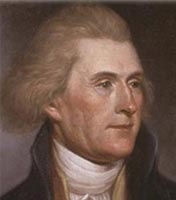Thomas Jefferson on the Sedition Act
Guiding Question
- What arguments were put forth in objection to the Sedition Act?
Learning Objectives
After completing the lessons in this unit, students will be able to:
- Cite arguments Jefferson used in objecting to the Sedition Act.
- Discuss Jefferson's opinion on how constitutional questions about the Sedition
Act could be resolved.
Supporters of Thomas Jefferson and James Madison believed the Sedition Act
was designed to repress political opposition to President John Adams and the
Federalists. Because the Democratic-Republicans were in the minority in Congress,
they were unable to stop passage of the bill. Jefferson did not believe the
Constitution gave the Judiciary power to declare unconstitutional a law passed
by Congress, so Jefferson and Madison resorted to another tactic.
1. Share with the class Jefferson's September 1804 letter to Mrs. John
Adams, describing his understanding of checks and balances in the Republic while
reflecting on the expired Sedition Act. (NOTE: The date of this letter
is worth noting. It was written a year or so after Marshall asserted the power
of judicial review in Marbury v. Madison, a decision that Jefferson
had found objectionable for a variety of reasons. While his beliefs may have
been the same before and after the decision, the timing should at least be taken
into account.)
You seem to think it devolved on the judges to decide on the validity of
the Sedition law. But nothing in the Constitution has given them a right to
decide for the Executive, more than the Executive to decide for them. Both
magistrates are equally independent in the sphere of action assigned to them.
The judges, believing the law constitutional, had a right to pass a sentence
of fine and imprisonment; because the power was placed in their hands by the
Constitution. But the Executive, believing the law to be unconstitutional,
were bound to remit the execution of it; because that power has been confided
to them by the Constitution. That instrument meant that its coordinate branches
should be checks on each other. But the opinion which gives to the judges
the right to decide what laws are constitutional, and what not, not only for
themselves in their own sphere of action, but for the Legislature and Executive
also, in their spheres, would make the judiciary a despotic branch. Nor does
the opinion of the unconstitutionality, and consequent nullity of that law,
remove all restraint from the overwhelming torrent of slander, which is confounding
all vice and virtue, all truth and falsehood, in the United States. The power
to do that is fully possessed by the several State Legislatures. It was reserved
to them, and was denied to the General Government, by the Constitution, according
to our construction of it. While we deny that Congress have a right to control
the freedom of the press, we have ever asserted the right of the States, and
their exclusive right, to do so.
—From Jefferson
on the Sedition Law: Page 795 and Jefferson
on the Sedition Law: Page 796 on the Electronic
Text Center of the University of Virginia, a link from the EDSITEment-reviewed
website Internet Public Library
Jefferson believed there was a horizontal set of checks and balances, with
the three branches checking each other, though only "in their own sphere of
action." The Judiciary could overrule a lower court on a case. It could not,
in his opinion, rule on acts of the Legislature or Executive. The Executive
could refuse to implement a law it believed to be unconstitutional. Jefferson
also believed there was a vertical set of checks and balances. States are bound
by the Constitution as well, but a state could refuse to comply with a Federal
law it considered unconstitutional. All powers not expressly granted to the
Federal government were reserved for the states; states could enact their own
laws about matters over which the Federal government has no jurisdiction. Jefferson
did not necessarily object to regulation of speech in principle.
If desired, as an extension to this activity, share these additional quotes
from Jefferson about judicial review from Thomas
Jefferson on Politics & Government, an exhibit of the Electronic
Text Center at the University of Virginia Library, a link from the EDSITEment
resource Internet Public Library:
The question whether the judges are invested with exclusive authority to
decide on the constitutionality of a law has been heretofore a subject of
consideration with me in the exercise of official duties. Certainly there
is not a word in the Constitution which has given that power to them more
than to the Executive or Legislative branches. —Thomas Jefferson to W.
H. Torrance, 1815
But the Chief Justice says, "There must be an ultimate arbiter somewhere."
True, there must; but does that prove it is either party? The ultimate arbiter
is the people of the Union, assembled by their deputies in convention, at
the call of Congress or of two-thirds of the States. Let them decide to which
they mean to give an authority claimed by two of their organs. And it has
been the peculiar wisdom and felicity of our Constitution, to have provided
this peaceable appeal, where that of other nations is at once to force. —Thomas
Jefferson to William Johnson, 1823
But, you may ask, if the two departments [i.e., federal and state] should
claim each the same subject of power, where is the common umpire to decide
ultimately between them? In cases of little importance or urgency, the prudence
of both parties will keep them aloof from the questionable ground; but if
it can neither be avoided nor compromised, a convention of the States must
be called to ascribe the doubtful power to that department which they may
think best. —Thomas Jefferson to John Cartwright, 1824
2. If desired, take the opportunity to briefly review the content of
the Sedition Act and the Alien Act. According to the seventh edition of The
Encyclopedia of American History (Morris and Morris, Harper Collins, 1996):
Several of the leading Republican publicists were European refugees. The
threat of war with France sharpened hostility to aliens and gave Federalists
an opportunity to impose severe restrictions…
25 June (1798) The Alien Act authorized the president to order out of the
U.S. all aliens regarded as dangerous to the public peace and safety, or suspected
of "treasonable or secret" inclinations. It expired in 1800…
14 July. Sedition Act made it a high misdemeanor, punishable by fine and imprisonment,
for citizens or aliens to enter into unlawful combinations opposing execution
of the national laws; to prevent a federal officer from performing his duties;
and to aid or attempt "any insurrection, riot, unlawful assembly, or combination."
A fine of not more than $2,000 and imprisonment not exceeding 2 years were
provided for persons convicted of publishing "any false, scandalous and malicious
writing" bringing into disrepute the U.S. government, Congress, or the president;
in force until 3 March 1801.
The Sedition Act was aimed at repressing political opposition…
Republicans attached the Alien and Sedition Acts as unnecessary, despotic,
and unconstitutional.
Distribute one Jefferson quote to each of five student groups from the handout
"Thomas Jefferson on the Alien and Sedition Acts" on pages
15-16 of the PDF file (see Preparing
to Teach This Curriculum Unit for download instructions). Have each group
of students describe their excerpt to the class, answering the following questions
in their description:
- What was Jefferson's position on the Sedition Act?
- What arguments against the act does Jefferson cite?
- What principles does Jefferson cite in relation to the Sedition Act and
the controversy that resulted?
- Which of Jefferson's remarks refer to partisan politics?
- What role, if any, does he believe partisan politics played in either the
creation of the Sedition Act or the controversy that followed?
3. Jefferson and Madison decided that action against the Sedition Act
(and the Alien Act) had to be taken at the state level. Share with the class
this excerpt from the Thomas
Jefferson Timeline on the EDSITEment-reviewed website American
Memory:
September-October. Jefferson and James Madison consult on how to block the
Alien and Sedition Acts at the state level. Jefferson, who is still vice president,
privately drafts resolutions against the Acts and has them introduced into
the Kentucky legislature. Madison drafts similar resolutions for the Virginia
legislature. In November the Kentucky legislature passes Jefferson's resolutions
declaring the Acts void, and in December the Virginia legislature passes Madison's,
declaring the Acts unconstitutional.
Now share with the class the annotated "Excerpts from the Virginia and Kentucky
Resolutions" on pages 17-18
of the PDF file (see Preparing
to Teach This Curriculum Unit for download instructions). Complete texts
of the Kentucky and
Virginia Resolutions
are available on the EDSITEment resource The
Avalon Project. Compare the two resolutions. Students interested in Madison's
complete explanation of the Virginia Resolutions can read Madison's
Report on the Virginia Resolutions on James
Madison: His Legacy, a link from the EDSITEment-reviewed website The
American President. For more on the Kentucky and Virginia Resolutions, consult
the Library of Congress's exhibit Jeffersonians
Claim Extreme Rights for States, a link from the EDSITEment resource American
Memory.
Assessment
Assign students a short position paper (2-3 pages) in which they become partisans and are asked to justify their support for either the Federalists or the Jeffersonian Republicans. Students should begin their essays with clear statements of their party affiliations. Avoiding hindsight, they should defend their choices using both practical and constitutional arguments, and they should challenge their opposition using the same criteria.
- What were Jefferson's objections to the Sedition Act?
- What did Jefferson believe were the motives behind those who supported the
Sedition Act?
- What actions did Jefferson believe should be taken against the Sedition
Act? What actions should not?
- In what ways was Jefferson acting out of partisanship?
- What were the key passages and principles in the Kentucky and Virginia Resolutions?
- In what ways did the Sedition Act abuse powers or take away fundamental
rights granted in the Constitution and/or Bill of Rights?
- Did the Sedition Act tend, as written, to do more to protect security or
to endanger freedom?
- Do you agree with Jefferson that states have the right to declare actions
of the Federal government unconstitutional?
Selected EDSITEment Websites
Standards Alignment
View your state’s standards
|





